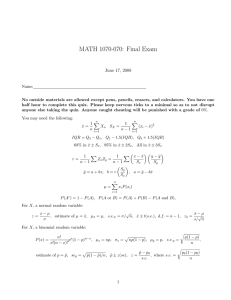- Inter-Quartile Range, - Outliers, - Boxplots. Today:
advertisement
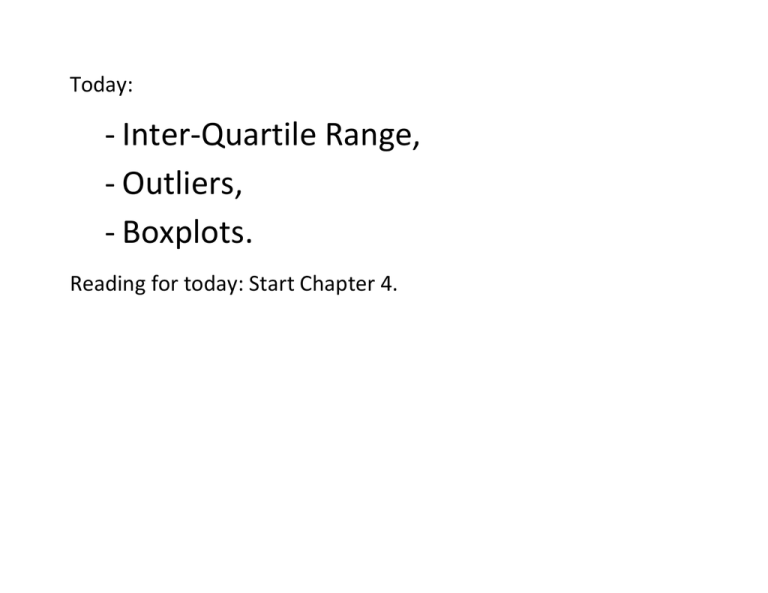
Today:
- Inter-Quartile Range,
- Outliers,
- Boxplots.
Reading for today: Start Chapter 4.
Quartiles and the Five Number Summary
- The five numbers are the Minimum (Q0), Lower
Quartile (Q1), Median (Q2), Upper Quartile (Q3),
and Maximum (Q4).
- Q1 means bigger than 1 Quarter of the data.
- Q3 means bigger than 3 Quarters of the data.
For the values {0, 1, 2, 4, 5, 5, 7, 10, 10, 12, 13, 17, 39},
the five number summary is: 0 3 7 12.5 39.
Inter-Quartile Range
- Even in the unimodal cases, neither the mean nor
the median describes the data adequately.
- The mean number of legs per Swede is 1.999,
clearly there’s something more we should know.
- The median of {30,31,32} is 31.
- The median of {-10000, 31, 10000} is also 31.
Inter-Quartile Range
- We also need measures of spread, like the InterQuartile Range. (Literally “range the between the
quartiles”, called the IQR for short).
- The Inter-Quartile range is calculated:
IQR = Q3 – Q1
- The size of the IQR indicates how spread out the
middle half of the data is.
Outliers (1.5 x IQR Rule)
- Now that we have a measure of spread, we can use
it to identify values that are much farther from the
________ than usual.
- How? ________ measures like the IQR tell us how
far a typical value could be from the average, so
anything much more than the typical distance can
be identified.
- We call these data points ________.
They (figuratively) lay outside the rest of the
data.
- Because an outlier stands out from the rest
of the data, it…
o might not belong there, or
o is worthy of extra attention.
- One way to define an outlier is
o anything below _______________ _ or…
o above ________________.
This is called the ________________. (Important).
- Example: {0, 1, 2, 4, 5, 5, 7, 10, 10, 12, 13, 17, 39}
Q1 = 3, Q3 = 12.5
IQR = 12.5 - 3 = 9.5.
Q1 – 1.5xIQR = 3 – 1.5(9.5)
= 3 -14.25 = -11.25
Anything less than -11.25 is an outlier.
In this case there are _____________ on the low
end.
- Example: {0, 1, 2, 4, 5, 5, 7, 10, 10, 12, 13, 17, 39}
Q1 = 3, Q3 = 12.5
IQR = 9.5
Q3 + 1.5xIQR = 12.5 + 1.5*9.5
= 12.5 + 14.25 = 26.75
Anything more than 26.75 is an outlier.
________________.
More on IQR and Outliers:
- There are other ways to define outliers, but 1.5xIQR
is one of the most straightforward.
- If our ________ has a natural restriction, (like it
can’t possibly be negative), it’s okay for an outlier
limit to be beyond that restriction.
- If a value is more than Q3 + 3*IQR or less than Q1 –
3*IQR it is sometimes called an ________ outlier.
- The standard graph for showing the median,
quartiles, and outliers of a data set is the boxplot,
for {0, 1, 2, 4, 5, 5, 7, 10, 10, 12, 13, 17, 39} it looks
like this:
- The ________ ________ ________ is in the boxplot:
- The box from 3 to 12.5 is the region between
________ and ________ .
- The line going through the middle of the box at 7 is
the ________.
-
- The lines going out the ends of the box are called
the ________. They show the range of values that
are ________________.
- The lower whisker goes to the lowest value, 1. The
upper whisker goes to 17 because it’s the biggest
value before the upper limit of 26.75 is hit.
- The individual dot at 39 shows an ________.
- Outliers in SPSS are labelled with their row number
so you can find them in data view.
- In SPSS extreme outliers are shown as ________.
- The farthest outliers on either side are the
________ and ________.
- If there are no outliers on a side, the end of the
whisker is that minimum or maximum.
Boxplots and Skew
- Skewed distributions have more extreme values on
one side, so a boxplot of a skewed distribution will
have one ________ longer than the other.
- There will also be more ________ on one side of
the boxplot than the other.
Side-by-side Boxplots
- Boxplots can also be used to compare the ________
of two samples.
- Example: Heights of adult men and women.
-
There is some overlap
In general men are taller.
The ________ is about the same.
Both distributions appear to be ________.
What exactly IS an outlier?
- It’s a value far from anything else that warrants
special consideration aside from the rest of the
data.
- Often it’s a mistake in data entry. If were recording
a grade of 73%, mistyped, and recorded 3% or
730%, both of these values would be far from the
rest of the data and would indicate that the data is
not being represented properly.
- If the times to finish a final exam had Q1 at 120
minutes and Q3 at 150 minutes, but someone
finished in 62 minutes, that person could be a
student with a stronger than recommended
background for that course or someone who gave
up during the exam.
- In both cases, their exam wouldn’t a good
________ ________ of the exams as whole.
- Sometimes outliers can tell your ________
________ and expectations are wrong, like in
minor hockey.
Minor Hockey and Outliers (See Malcolm Gladwell’s
Outliers) (this is for interest)
- If I took samples of 25 random people over and
over and got their ‘average’ birthdays, I would get a
bell curve around late June or early July. (Using
days since January 1 as the value of people’s
birthdays) This would fit my assumption that the
way I took my sample had nothing to do with when
people were born, so the average birthday should
be right near the middle of the year.
- If my sample is Team Canada in the World Junior
Hockey Championship, however, the average is
much closer to the beginning of the year.
- The average birthday of champion hockey players is
an outlier compared to the average of other groups
of 25. The data was entered correctly, so the
population must be different somehow.
It’s possible this happened by chance, but unlikely in the
context of the other samples. My assumption that
birthdays and being a hockey champion are unrelated
may be wrong.
Next lecture:
Standard Deviation and the Normal Curve
(read more of chapter 4)
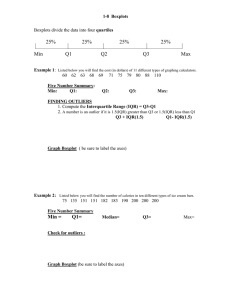
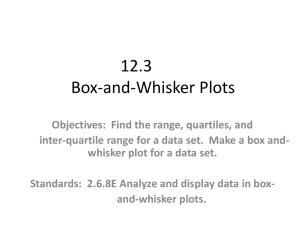
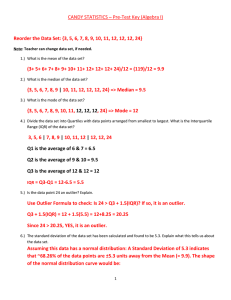
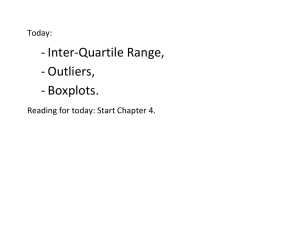
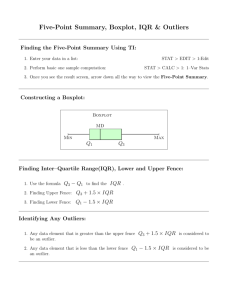
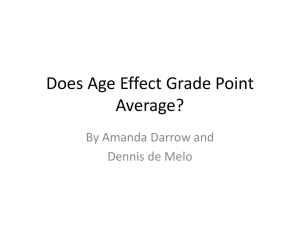
![[#GEOD-114] Triaxus univariate spatial outlier detection](http://s3.studylib.net/store/data/007657280_2-99dcc0097f6cacf303cbcdee7f6efdd2-300x300.png)
